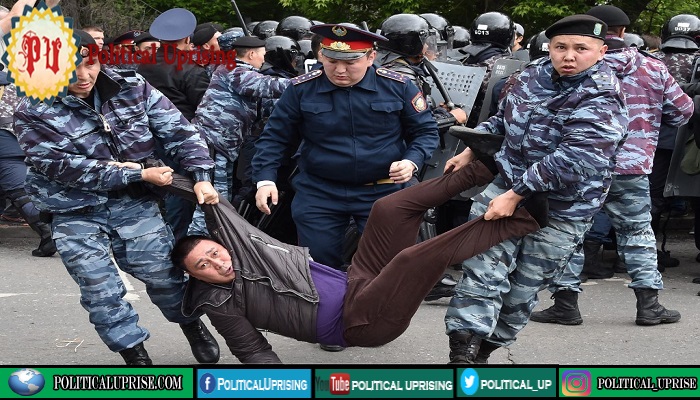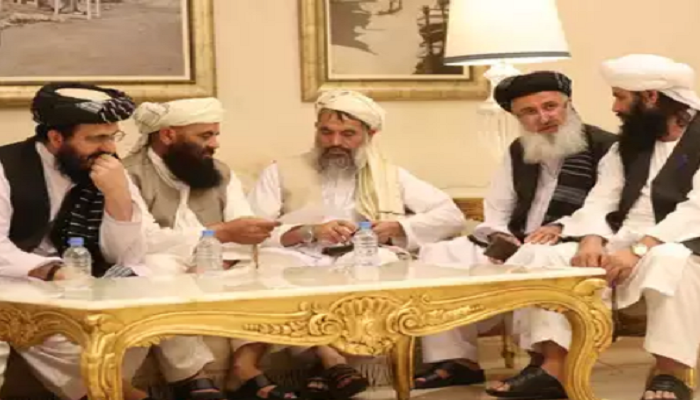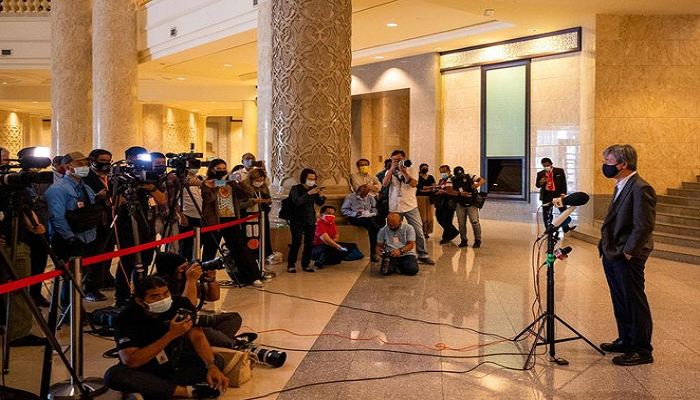Kazakh Police crackdown on opposition Party ahead of parliamentary elections raises concerns about democratic participation in the Central Asian nation.
Police arrest would-be delegates of founding congress of opposition party, raising fears about political participation.
Leaders and would-be delegates of the founding congress of an opposition party have been arrested in Kazakhstan ahead of next year’s parliamentary elections, raising concerns about democratic participation in the Central Asian nation.
The crackdown started last week with a reported arson and the arrest of three activists who were heading to the largest city Almaty for Saturday’s congress of the nascent Democratic Party of Kazakhstan (DPK) led by former journalist Zhanbolat Mamai.
The move was seen as an attempt to sabotage the assembly of delegates, as Kazakh law requires the participation of at least 1,000 people in the founding congress of a political party for it to be officially recognised.
Mamai, who cancelled the event scheduled for February 22 over the arrests and held a protest rally on Saturday instead, was also detained for three days along with his pregnant wife and dozens of other demonstrators.
US national adviser disputes intelligence claims of Russian election meddling
Dimash Alzhanov, a prominent member of the Oyan, Qazaqstan (Wake Up, Kazakhstan) civic movement, which calls for a parliamentary republic and fair elections said that any attempt to create a genuine opposition party was doomed to fail in the current political system.
“There is only one way of getting registration. You have to make a deal with the regime. If you just follow the registration procedure and bring all the documents to the Ministry of Justice, they will just not register you. They will have one hundred reasons not to do so,” he said.
Kazakh law mandates at least 1,000 people, representing two-thirds of the regions and major cities, participate in the founding congress of a political party. It is also required that the party have 40,000 members.
Once a party is registered, it receives funding from the state.
Alzhanov said “Kazakhstan is a very well-sustained autocracy” with the government using a combination of “repression, cooptation and patronage system” in order “to fake a democratic process”.
“We have one dominant party, the party of the president Nur Otan and the other five are technical parties who receive more than $1m annually from the state budget,” he said.
“You don’t have people behind them, you don’t have a serious structure behind them. They are registered by the authorities to have some sort of multi-party system.”
Until last year, Kazakhstan was ruled by the same president Nursultan Nazarbayev who took power when the oil-rich country of 19 million people gained independence after the collapse of the Soviet Union in 1991.
His successor, Kassym-Jomart Tokayev, who renamed the capital Astana to Nur-Sultan to honour Nazarbayev, promised to carry out reforms, easing the restrictions on protests and the establishment of political parties.
But there is little sign of political reforms in the country, where holding up a blank sheet of paper in protest can lead to an arrest.
Demonstration without pre-approval from authorities is considered illegal, but permits are almost never granted for political rallies.
After last week’s crackdown, Amnesty International condemned the Kazakh authorities, saying the “cowardly campaign of intimidation against critics shows how badly the government fears freedom of expression”.
“These attempts to crush Kazakhstan’s nascent opposition movement are shameful. Forming a political party is a manifestation of the fundamental human rights to freedom of expression, peaceful assembly and association,” the global rights group said in a statement.
Cut-copy-paste inventor died at age 74
“Kazakhstan’s authorities must fully respect these rights and release anyone who has been detained in the context of protests or opposition support,” it said.
Kazakhstan is scheduled to hold its next parliamentary elections in 2021 with little hope for the vote to be free or fair despite a change in the country’s leadership.
President Tokayev, who succeeded Nazarbayev last year, has pledged to amend laws on public assembly as part of his political reform promises.
Nargis Kassenova, a Kazakh scholar and senior fellow in the Central Asia programme at Harvard University’s Davis Center said that on the one hand, the government seems to understand there is a need for “a certain reformatting of the political scene” but on the other, “the uncertainty of consequences is scary”.
“The authorities have been risk-averse for so long and purged the domestic political life so thoroughly, that now they probably find themselves confused how to proceed,” she said.
Kassenova also said “it doesn’t help” that there are two presidents in the country, referring to the fact that Nazarbayev remains in charge. The former president continues to head the governing party and remains chairman for life of the powerful Security Council.
“This duumvirate is disorienting and conducive to power struggles and negotiations inside the government,” she said.
Ruslan Zhangazy, a political analyst who has consulted with a number of government bodies said that the parliamentary elections will be dominated by “fragmentation of power” instead of a race with the opposition.
“The competition between the government and the opposition will be controlled and limited, while the struggle between power groups can intensify,” he said.
Zhangazy said there appeared to be “several centres of political decision-making” in the government with no “single strategic vision” for the future of the country.
Kazakh Police crackdown on opposition ended hopes for fair polls.



